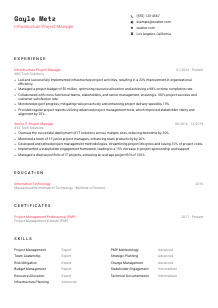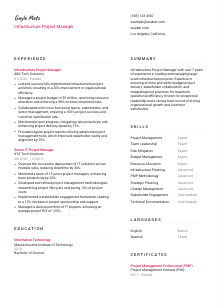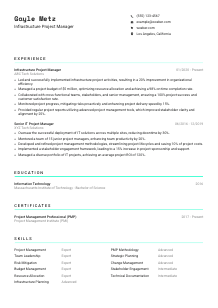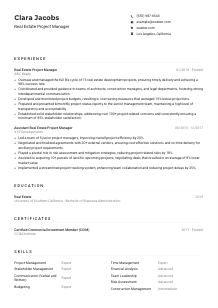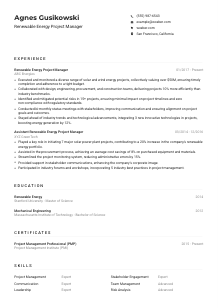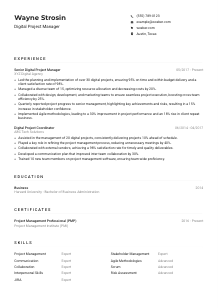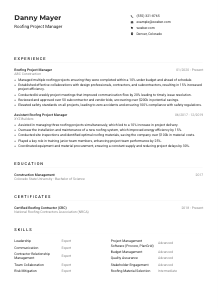Infrastructure Project Manager Resume Example
Juggling blueprints, but your resume feels under construction? Set sights on this Infrastructure Project Manager resume example, architected with Wozber free resume builder. Discover how to integrate your project prowess and attention to detail with job specs, so your career edifices always rise on solid ground!
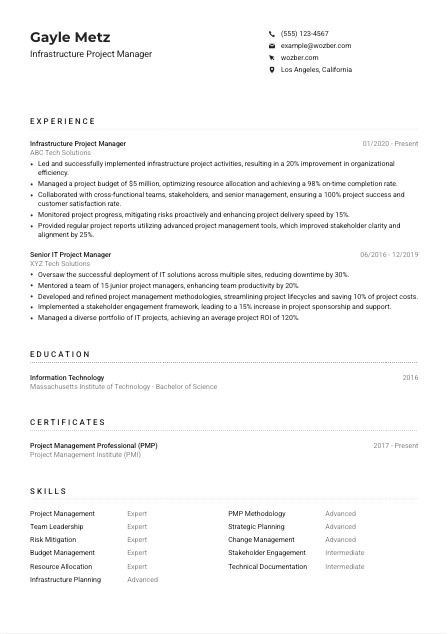
How to write an Infrastructure Project Manager resume?
Are you poised to translate your infrastructure project management feats into a career-advancing opportunity? Look no further! Standing out in the competitive job arena requires more than just expertise; it necessitates a resume crafted with precision, mirroring the intricacies of your chosen role.
Using Wozber's free resume builder, let's embark on a path to distill your professional essence into a resume that not only meets the mark but surpasses expectations. Dive into crafting a resume tailor-made for an Infrastructure Project Manager position, designed to navigate through ATS filters with ease.
Personal Details
The gateway to your resume, the Personal Details section, should be crafted with care. It's the first handshake with potential employers, setting the initial tone of your professional story. Let's optimize this section specifically for an Infrastructure Project Manager role, ensuring it speaks volumes in just a few lines.
1. Name as Your Brand
Your name isn't just a label; it's your professional brand. As an Infrastructure Project Manager, ensure it's boldly at the forefront in a clean, readable font, setting the stage for the details to come.
2. Tailoring to the Title
Direct alignment with the job title right off the bat signals to hiring managers and ATS algorithms alike that you're a ready fit. Place "Infrastructure Project Manager" prominently just below your name, mirroring the job you're after.
3. Essential Contact Info
In an era of digital communication, your contact information must be precise and professional. An email format such as firstname.lastname@email.com conveys seriousness. And remember, a local phone number without typos reassures your availability.
4. Matching Location Matters
Given the job's locale specification - Los Angeles, California - it's strategic to highlight your matching, or nearby, location. This small detail significantly boosts your candidacy by aligning with logistical expectations.
5. The Professional Profile
A link to a professionally-curated LinkedIn profile allows interested employers to delve deeper. An aligned LinkedIn profile enhances credibility and provides a richer narrative of your professional journey.
Takeaway
Craft your Personal Details with attention and intention. This section is your professional greeting; make it concise, aligned, and reflective of your readiness for the role. Let it lay the groundwork for the detailed narrative that follows.





Experience
The Experience section is your professional battleground, where you showcase your strategic victories and proven strengths as an Infrastructure Project Manager. It's not just about listing jobs; it's about narrating your journey through relevant achievements.
- Led and successfully implemented infrastructure project activities, resulting in a 20% improvement in organizational efficiency.
- Managed a project budget of $5 million, optimizing resource allocation and achieving a 98% on‑time completion rate.
- Collaborated with cross‑functional teams, stakeholders, and senior management, ensuring a 100% project success and customer satisfaction rate.
- Monitored project progress, mitigating risks proactively and enhancing project delivery speed by 15%.
- Provided regular project reports utilizing advanced project management tools, which improved stakeholder clarity and alignment by 25%.
- Oversaw the successful deployment of IT solutions across multiple sites, reducing downtime by 30%.
- Mentored a team of 15 junior project managers, enhancing team productivity by 20%.
- Developed and refined project management methodologies, streamlining project lifecycles and saving 10% of project costs.
- Implemented a stakeholder engagement framework, leading to a 15% increase in project sponsorship and support.
- Managed a diverse portfolio of IT projects, achieving an average project ROI of 120%.
1. Deciphering Job Demands
Start with segregating the job requirements. Look for keywords like "infrastructure project activities", "budget management", and "cross-functional teams". Understanding these demands will guide you in highlighting corresponding achievements.
2. Structured Narration
Organize your roles in reverse-chronological order. Each entry should begin with your job title followed by the company name and your tenure. This clean layout aids both human readers and ATS in grasping your career progress.
3. Achievement-Focused Entries
For each role, focus on achievements that resonate with the Infrastructure Project Manager position. Use bullet points to detail how you led projects to success, optimized budgets, and collaborated for high satisfaction rates. Quantifiable successes, like "enhancing organizational efficiency by 20%", are powerful.
4. The Power of Numbers
Quantify your accomplishments wherever possible. Managed a $5 million project budget? Achieved a 98% on-time completion rate? Numbers draw attention and lend credibility to your claims, providing tangible evidence of your effectiveness.
5. Relevance is Key
In every bullet point and keyword, ensure direct relevance to the Infrastructure Project Manager role. Extraneous details dilute your narrative. Focus on what matters to this specific role, tailoring each entry to reflect your suitability.
Takeaway
Your experience should be a testament to your qualifications and readiness for the role. By framing your past roles through the lens of the job requirements, you're not just a candidate; you're the solution to their needs. Tailor, quantify, and thrive.
Education
The Education section, although straightforward, holds the potential to further align your resume with the Infrastructure Project Manager position. It's not just about listing degrees; it's about underlining the foundation of your expertise.
1. Pinpointing Requirements
Starting point: the job demands a "Bachelor's degree in Engineering, Information Technology, or a related field". This requirement forms the cornerstone of this section, guiding you to highlight relevant academic achievements.
2. Clear Structuring
Maintain simplicity and clarity. Your highest relevant degree should be featured with the name of the degree, field of study, institution, and graduation year. This clean format resonates well with both ATS and hiring managers.
3. Degree Specification
Emphasize your degree that matches the job's requirement. For instance, "Bachelor of Science in Information Technology" precisely links your academic background with the prospective role's demands.
4. Relevant Coursework
Though not always necessary, listing pertinent courses can be beneficial, especially for recent graduates or those with less direct experience. Highlight any specialized training or projects that showcase skills relevant to infrastructure project management.
5. Other Academic Achievements
For roles demanding technical and leadership prowess, like an Infrastructure Project Manager, highlight any honors, extracurricular activities, or significant projects that demonstrate these capabilities. Remember, tailor to the level of the position.
Takeaway
Your Education section should succinctly underscore the knowledge underpinning your professional skills. By aligning your educational credentials with job requirements, you set a solid foundation that supports your claim to the role.
Certificates
In the dynamic field of project management, continuous learning is key. Certifications not only underscore your dedication but also align your expertise with the specialized demands of the Infrastructure Project Manager role.
1. Reflecting Job Prerequisites
The job seeks a PMP certification or equivalent. This specific requirement guides your certificate section, prompting you to prioritize and spotlight any such qualifications that directly resonate with the role.
2. Prioritization of Relevant Certificates
While an exhaustive list of certificates might seem impressive, relevance takes precedence. Highlight certificates like PMP that are directly linked to project management, showing a specialized fit for the position.
3. Transparency with Dates
Providing dates for acquisition or expiration of your certificates lends credibility and shows your qualifications are current. In rapidly evolving fields, staying updated is crucial and should be transparently communicated.
4. Commitment to Learning
Continual learning and renewal of certifications reflect your commitment to staying at the forefront of project management practices. Highlighting recent and relevant certifications showcases your proactive approach and preparedness for the demands of the role.
Takeaway
Your certifications are not merely educational accomplishments; they are markers of your ongoing dedication to professional excellence. By clearly and relevantly presenting these, you distinguish yourself as a lifelong learner and a prime candidate.
Skills
Your skills section is a strategic list consolidating your professional prowess. Here, let's ingeniously align it with the job description of an Infrastructure Project Manager, ensuring it serves as a powerful testimony to your qualifications.
1. Decoding The Job
Firstly, extract key skills directly from the job description. Look for explicit skills like "Project Management", "Budget Management", and "Cross-functional Team Leadership". Your list should echo the precise requirements of the role.
2. Curating Your Skill Set
Focus on skills that directly address the job's needs. As an Infrastructure Project Manager, your mastery in "Risk Mitigation", "Resource Allocation", and knowledge of "PMP Methodology" are invaluable. This resonates with hiring managers and parses well through ATS.
3. Organized Display
Position your most relevant and expert skills at the beginning, ensuring a descending order of proficiency. This structured approach highlights your strengths in areas most critical to the job, making for an impactful, easy-to-scan list.
Takeaway
Think of your skills section as the anchor of your professional toolkit. It showcases your readiness and capability to excel in the desired role. Precision in mirroring the job requirements here is the key to cementing your match for the position.
Languages
In today's interconnected world, multilingualism can be a significant asset. Here's how to tailor the Languages section for an Infrastructure Project Manager role, making your linguistic abilities shine.
1. Job Language Requirement
The job emphasizes being "adept in English". Prioritize this language first, indicating your proficiency level clearly, to meet this essential requirement head-on.
2. Additional Language Assets
Listing other languages you are fluent in, such as Spanish, showcases your ability to communicate in diverse settings. This can be particularly valuable in roles requiring coordination across different geographical locations.
3. Honesty in Proficiency
Clearly delineate your language proficiency levels. Whether you are "Native", "Fluent", "Intermediate", or possess "Basic" skills, truthful representation ensures expectations are set accurately. This clarity can be crucial in roles demanding precise communication.
4. The Role's Geographic Scope
Understanding the geographic scope and communication needs of the position can help position your multilingual abilities as a distinct advantage. While not explicitly demanded, it subtly enhances your candidacy, especially in roles with global reach.
5. Continuous Language Learning
Expressing ongoing efforts to improve language skills, particularly those relevant to the job or industry, can illustrate initiative and adaptability - traits highly valued in project management.
Takeaway
Your linguistic skills do more than just add a line on your resume; they open doors to effective communication and collaboration in global projects. Embrace your multilingualism as a unique facet of your professional profile.
Summary
The Professional Summary is your golden opportunity to encapsulate your identity as an Infrastructure Project Manager. It's your pitch, your headline news - let's make it impactful, specific, and resonant with the job you're vying for.
1. Capturing the Role's Essence
Begin by thoroughly digesting the job description. Note the pivotal requirements and preferred qualifications - these elements should be subtly woven into your summary.
2. A Strong Opening
Kickstart with a statement that frames you squarely in the role - "Infrastructure Project Manager with over 7 years of experience...". This immediately places you within the context the hiring manager is focused on.
3. Addressing Key Competencies
Elevate your opening by integrating core job requirements and your success stories - aligning with specified needs such as "leading and managing large-scale infrastructure projects" and achieving "on-time and within-budget project delivery". This creates a narrative of capability and achievement.
4. Keeping It Concise
This section should capture your professional essence without veering into excessive detail. Three to five compelling lines serve as a teaser to the depth of experience detailed in subsequent sections.
Takeaway
A well-crafted summary not only aligns with the role but entices the hiring manager to dive deeper into your resume. Precisely tailored to the Infrastructure Project Manager position, it positions you as not just a candidate, but as the candidate.
Embarking on Your Infrastructure Project Management Journey
With this guide, you're armed to craft an ATS-compliant resume that stands up to the scrutiny of both algorithms and human eyes. Use Wozber's free resume builder, ATS-friendly resume templates, and ATS resume scanner to ensure your resume isn't just seen but is compelling. Your career journey as an Infrastructure Project Manager is laden with opportunities; let your resume be the key that unlocks them. Aim high, tailor meticulously, and launch into your next career chapter with confidence.

- Bachelor's degree in Engineering, Information Technology, or a related field.
- A minimum of 5 years of experience in project management with a focus on infrastructure or IT-related projects.
- Demonstrated proficiency with project management tools, methodologies, and best practices.
- Exceptional leadership, communication, and interpersonal skills.
- PMP (Project Management Professional) certification or equivalent is preferred.
- Must be adept in English.
- Must be located in Los Angeles, California.
- Lead, plan, and implement infrastructure project activities ensuring they are aligned with organizational goals.
- Manage project budgets, resources, and timelines to ensure successful completion within defined parameters.
- Collaborate closely with cross-functional teams, stakeholders, and senior management to ensure project success and customer satisfaction.
- Monitor project progress, mitigate risk, and resolve any issues that may arise during the course of the project.
- Provide regular project status updates and reports to management and key stakeholders.





